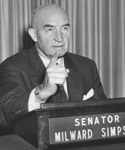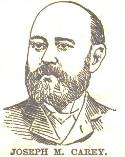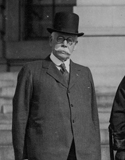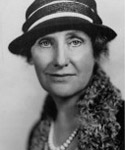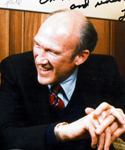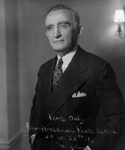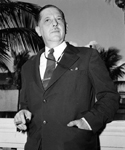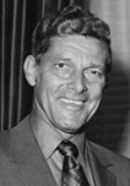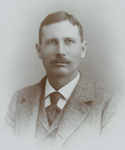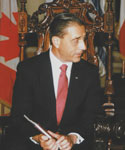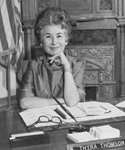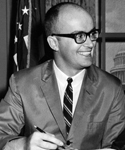Noteworthy Collections
Milward L. Simpson Papers
Milward L. Simpson was Governor of Wyoming from 1955-1959 and was elected to the U.S. Senate in 1962. He retired in 1967. During his lifetime, Simpson served on many boards including Husky Oil, the Boy Scouts of America, the Buffalo Bill Historical Center, the Gottsche Foundation, the University of Wyoming Board of Trustees, and the Wyoming Game and Fish Commission.
Link to Collection Inventory Link to Digital Objects
Carey Family Papers
Joseph Maull Carey served as mayor of Cheyenne from 1881-1885 and as territorial delegate to the United States Congress from 1885-1891. In 1890 Carey introduced the act establishing Wyoming statehood and authored the famous Carey Act, a bill which contributed to irrigation progress in the Rocky Mountain states. He was then elected a United States Senator for Wyoming and served until his term expired in 1895. In 1910 Carey was elected governor, serving until 1915.
Robert Carey served as governor of Wyoming from 1920-1924 and U.S. Senator from 1930-1937. In addition to as serving as manager of the Wheatland Development Company and Wheatland Roller Mills Company, he was president of the Wyoming Stock Growers Association from 1917-1918.
Link to Collection Inventory Link to Digital Objects
Francis E. Warren Papers
Warren was a prominent Wyoming businessman and politician. He served as U.S. Senator of Wyoming for 37 years, and was the first Governor of Wyoming. He twice served as territorial Governor before Wyoming was given statehood. His business interests include the Warren Mercantile Company, the Warren Live Stock Company, and Wyoming Irrigation Company.
Link to Collection Inventory Link to Digital Objects
Nellie Tayloe Ross Papers
Nellie Tayloe Ross (1876-1977) was the first woman governor in the United States. Born in St. Joseph, Missouri, she married William Bradford Ross in 1902 and they lived in Cheyenne, Wyoming. William B. Ross, a Democrat, was elected Governor of Wyoming in 1922. Three weeks before election day in 1924, William B. Ross died and Nellie Tayloe Ross was elected in his stead. Nellie Ross lost in her bid for reelection in 1926. She was appointed Director of the U.S. Mint in 1933 by President Franklin D. Roosevelt and served in that capacity until her retirement in 1953.
Link to Collection Inventory Link to Digital Objects
Alan K. Simpson Papers
Simpson began his political career in 1964 when he was elected to the Wyoming State Legislature. He served for the next 13 years in the Wyoming House of Representatives, holding the offices of majority whip, majority floor leader, and speaker pro-tem. In 1978, he ran for and was elected as a Republican to the United States Senate, where he served until 1997. While in the Senate, Simpson served as majority leader, assistant minority leader, and chairman of the Veterans' Affairs Committee. He also served on the Judiciary Committee and chaired its Subcommittee on Immigration and Refugee Policy.
Link to Collection Inventory Link to Digital Objects
Malcolm Wallop Papers
Malcolm Wallop was a United States Senator from Wyoming from 1977-1995. Wallop helped to establish more state control of natural resources, reduced income taxation, argued for greater 5th Amendment protection for private property owners and advocated a more aggressive role in U.S. defense policy during the later stages of the Cold War. His most notable legislative achievement was his authorship of the Wallop Amendment to the 1977 Surface Mining Act. He also authored a highly influential bill cutting the tax on inheritance and gifts.
Joseph C. O’Mahoney Papers
O’Mahoney was a prominent Wyoming lawyer and politician who was appointed to fill the Senate vacancy created by the death of Senator Kendrick, and ending up serving as Senator for 25 years between 1933 and 1960. During his Senate career O'Mahoney served on several Senate committees and was chair of Interior and Insular Affairs (chair, 1949-1953), and Temporary National Economic Committee (chair). He was a supporter of western water and mineral development, a New Deal Democrat who split with Franklin Roosevelt over the Supreme Court packing issue, and a foe of monopolies.
Link to Collection Inventory Link to Digital Objects
Thurman Wesley Arnold Papers
Thurman Wesley Arnold, practiced law in Laramie, Wyoming, and served as Mayor from 1923 to 1924. He was dean of the University of West Virginia College of Law from 1927 to 1930 and taught at Yale from 1930 to 1938. He was named assistant attorney general of the U.S. in charge of the antitrust division in 1938 and was a Department of Justice representative on the Temporary National Economic Committee from 1938 to 1941. He was appointed to the U.S. Court of Appeals for the District of Columbia and served from 1943 to 1945.
Link to Collection Inventory Link to Digital Objects
Craig Lyle Thomas Papers
Craig Thomas served over twelve years as Republican United States Senator from Wyoming, and was considered an expert on agriculture and rural development. Before that he succeeded Dick Cheney as U.S. Representative in the House. Thomas served as Chairman of the National Parks subcommittee and authored legislation to provide funding and management reforms to protect America’s national parks into the 21st century. As a senior member of the Senate’s influential Finance Committee, Thomas was involved in issues such as social security, trade, rural health care, and tax reform.
Gale W. McGee Papers
Gale McGee was a University of Wyoming Professor, a U.S. Senator from Wyoming (1959-77), and a U.S. Ambassador to the Organization of American States (OAS) (1977-81). He was an internationalist and a staunch supporter of U.S. involvement in the Vietnam War. McGee supported many of the social, environmental, and conservation programs that became law in the sixties and seventies. While on the Appropriations Committee, he successfully directed federal aid for Wyoming's conservation, energy, and infrastructure projects. As President Carter's Ambassador to the OAS, McGee was instrumental in the Senate ratification of the Panama Canal Treaty.
Link to Collection Inventory Link to Digital Objects
John B. Kendrick Papers
John Benjamin Kendrick was a Wyoming businessman who migrated to the state to serve as superintendent of the Converse Cattle Company in 1887. In 1910, Kendrick was elected to the Wyoming State Senate, representing Sheridan County. In 1914 he won the Wyoming governorship as a Democrat, serving until 1916 when he was elected to the U. S. Senate and re-elected in 1922 and 1928. The cattle business was Kendrick’s chief concern, as a businessman and as a politician. He was very active in the economic and community development of Sheridan, Wyoming.
Clifford P. Hansen Papers
Hansen is best known as a former Wyoming governor and President of the Wyoming Stock Grower’s Association. He was a Teton County commissioner in the 1940s, and opposed the expansion of Teton National Park. He later served as a U.S. senator for Wyoming. During his term he backed reservoir projects and designated national recreation and wilderness areas in Wyoming. He was one of eight senators to vote against sending the Equal Rights Amendment to the state level. One of his best-known achievements was increasing the percentage of Wyoming’s mineral severance tax.
Thomas F. Stroock Papers
Thomas Stroock was a Wyoming State Senator, U.S. Ambassador to Guatemala, and businessman. Legislation sponsored by Stroock in the Wyoming Legislature included the Wyoming Air Quality Act, the Wyoming Water Quality Act, and the Wyoming Mineral Royalty Recovery Act. From 1989 to 1992, he served as U.S. Ambassador to Guatemala, appointed by President George H.W. Bush. During his ambassadorship, Stroock was noted for his advocacy of human rights and social justice in this Central American country.
Teno Roncalio Papers
Roncalio was a lawyer and Democratic politician from Wyoming. He practiced law in Cheyenne and served as prosecuting attorney for Laramie County. In 1961, President Kennedy appointed him to the cabinet-level position of chairman of the International Joint Commission of the United States and Canada. Roncalio served five terms as a U.S. Representative for the State of Wyoming and was instrumental in blocking Project Wagon Wheel, in which the Atomic Energy Commission planned to detonate nuclear devices underground in southwestern Wyoming to free natural gas from rock formations.
Link to Collection Inventory Link to Digital Objects
Harriett Elizabeth Byrd Papers
Byrd is a former Wyoming State Representative, Wyoming State Senator, and elementary school teacher from Cheyenne, Wyoming. In 1980, Byrd was elected to the Wyoming State House of Representatives and became the first African American legislator in Wyoming since statehood as well as the first African American woman to ever serve in the Wyoming State Legislature. She was also the first African American to serve in the Wyoming State Senate. During her legislative career, Byrd was the prime sponsor of legislation to create Martin Luther King, Jr./Wyoming Equality Day.
Link to Collection Inventory Link to Digital Objects
Thyra Thomson Papers
Thyra Thomson was the Secretary of State in Wyoming from 1962-1986. For many of those years, she was the highest elected woman state official in the United States. She was active with the Equal Rights Amendment, public land and oil lease issues, and securities.
Link to Collection Inventory Link to Digital Objects
Lester C. Hunt Papers
Lester Calloway Hunt was a Wyoming Governor and United States Senator. He was elected to the Wyoming House of Representatives in 1932 as a Democrat and also served two terms as secretary of state from 1935-1943. As Wyoming's secretary of state, Hunt designed the state's "bucking horse" automobile license plates. Hunt was elected governor of Wyoming in 1942 and 1946, and U. S. senator in 1948, a position he held until his death in 1954.
Link to Collection Inventory Link to Digital Objects
James G. Watt Papers
James G. Watt began his long and distinguished political career in 1962, when he joined the campaign to elect Milward Simpson to U.S. Senator. Watt held numerous positions in Washington D.C. including Director of the Bureau of Outdoor Recreation, commissioner and vice-chairman of the Federal Power Commission, and Secretary of the Interior of the United States, appointed by President Reagan. He was also the President and Chief Legal Officer of the Mountain States Legal Foundation, based in Colorado.

